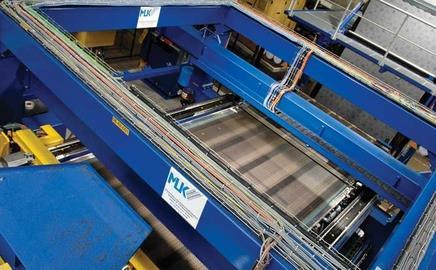This category was won by a carpet tile maker that has made excellent use of cutting edge technology (literally). Sponsored by Marks & Spencer
Winner
InterfaceFlor
Fifteen years ago, InterfaceFLOR committed itself to making sustainability a key part of its business process and, according to the judges, it’s still innovating. The company, which makes carpet tiles, operates in an industry that is traditionally carbon intensive. However, it has changed its business model to reduce the environmental impact of it processes. This is embodied in Mission Zero, the company’s pledge to eliminate any negative impact it has on the environment by 2020. Achievements over the past 18 months include the installation of a machine that feeds industrial waste and used tiles into the production process, and the installation of an ultrasonic cutting machine that will eliminate 310 tonnes of waste material a year from manufacturing.
Highly commended
ICI Paints AkzoNobel
This company encourages its staff to take home used coffee grains to spread on their gardens: that’s how seriously it takes sustainability. It is also working to reduce the whole-life footprint of the decorating process and minimise the environmental impacts of its own operations. Its Sustainability in Action 2009 policy has led to the introduction of innovative products such Ecosure, its low carbon and volatile organic compound paint range, and Light & Space, an energy-saving paint. It also has innovative recycling and waste management solutions such as the Environmental Wash System and the Paint Solidifier.
Runners-up
Aggregate Industries
Aggregate Industries was the first company in the world to be awarded BES 6001, the new independent certification standard from BRE Global for the responsible sourcing of construction products. With one assessment covering raw material, its manufacture and delivery, its use, re-use and recyclability, Aggregate Industries’ products can now be specified in the knowledge that the materials provide sustainable and futureproof solutions. But this is only one strand of the company’s sustainability agenda. Other initiatives include products such as Enviroblock and Enviromasonry which have up to 92% recycled content.
Green Building Store
Green Building Store is a specialist maker and supplier of sustainable building products based in West Yorkshire. In January this year it launched an extensive range of Passivhaus products and services to help the uptake of Passivhaus construction in the UK, which could create houses that use 90% less energy for space heating than standard buildings. The company’s construction division, the Green Building Company, is currently building the Denby Dale Passivhaus, one of the first certified Passivhauses in the UK.
Kingspan Insulation
Kingspan Insulation first commissioned a full independent sustainability appraisal of the whole of its operations at its Pembridge facility in 2004, using the SPeAR framework from Arup. The findings were then used to formulate an Action Plan for improvement, which has been implemented, reviewed, updated and periodically reported on since then.This year, SPeAR has once again been applied, but this time it incorporates the GRI G3 guideline reporting requirements, which is the world standard for sustainability reporting. The report also covers its new facility in Selby, which it acquired in 2008, which means that it covers the whole of the company’s manufacturing operations.
Lafarge Readymix
Under the Global Reporting Inititative – the world’s most widely used sustainability reporting framework – Lafarge Readymix achieved an A+ for all of its operations. Product initiatives include Extensia – a low shrinkage concrete that doesn’t require any steel mesh or fibres, thereby reducing carbon emissions by 20%; Envirocrete which reduces the cement content of concrete by up to 90%; and Pervious Concrete, which can be used for sustainable urban drainage.
Topics
Sustainability Awards 2009

- 1
- 2
- 3
- 4
- 5
- 6
- 7
 Currently
reading
Currently
reading
Sustainable Manufacturer or Supplier of the Year
- 9
- 10
- 11
- 12
















































No comments yet